- Home
- Chris Wraight
The End Times | The Fall of Altdorf Page 9
The End Times | The Fall of Altdorf Read online
Page 9
‘Superstition,’ muttered Gausser, though with no great certainty.
Martak raised a dirty eyebrow. ‘You think so? I’ll remind you of that when the wind is screaming and the earth beneath our feet begins to move.’
‘That is already taking place,’ observed Haupt-Anderssen archly.
He was right – reports had started coming from across the city. Panicked residents had begun to flee the poorer quarters after wells had sprouted foul weeds overnight, and gutters had burst open with broods of writhing rats. The nights had been filled with unearthly screams, though the City Watch had never been able to track them down. Some even said that the river itself was changing, thickening up like broth over a stove.
‘And that is your task, wizard,’ accused von Liebwitz. ‘Let us look to the defences – your kind should be cleansing the city.’
Martak glared at her darkly. ‘We’re doing our part. It would help if I weren’t summoned to all these damned councils.’
‘We need to determine the order of defence,’ insisted Gausser, his cheeks reddening.
‘So you can master us all,’ sniped von Liebwitz.
Haupt-Anderssen laughed at that, and Gausser started to shout something about the noted cowardice of Wissenlanders, to which their elector vigorously responded.
By then, though, Martak was not listening, and neither was Zintler. Heavy crashes could be heard from outside the chamber, echoing up the long corridors. The Reikscaptain drew his blade, and slowly moved towards the double-door entrance. Two guards on either side of the portal did likewise. The commotion drew closer, growing louder on the far side.
Then the twin doors slammed back, and a band of heavily armed men broke in. They were plate-armoured, and bore the marks of a hard road on travel-worn garb.
‘Stand down!’ shouted Zintler, barring their passage with commendable bravery, seeing as how he was outnumbered eight to three. ‘This is a private council – who dares to interrupt?’
The intruders parted, allowing one of their number to stride to the forefront. Unlike the others, he was helm-less, exposing a hawk-like visage barred by a long, carefully lacquered moustache. There could be no mistaking the proud features that adorned coins and devotional lockets from Helmgart to Middenheim, though they had been badly disfigured by claw-marks along one cheek. The lines were still raw and bloody, making the Reiksmarshal look half daemonic.
‘What is this rabble?’ rasped Kurt Helborg, striding up to the electors. ‘Where is Todbringer? Where are the Reikland generals? And who is this beggar?’
Martak bowed clumsily. ‘The Supreme Patriarch, my lord. Or so they tell me.’
Helborg stared at him, incredulous, before turning to Gausser. ‘My lord elector, tell me this is some foul jest.’
Gausser shot him an apologetic look. ‘Times are not what they were, lord Reiksmarshal.’
Von Liebwitz drew up to Helborg then, a rapt expression on her aged face. ‘You are alive! Thank the gods. Now we can plan our defence in earnest – what of the Emperor? What of Lord Schwarzhelm?’
Helborg briefly looked lost then, as if the questions confused him. His gaze ran around the chamber, from Gausser to von Liebwitz to Haupt-Anderssen to Martak. ‘This is the war council?’
Martak sniffed noisily, dislodging a troublesome clot of dried mucus that had been plaguing him since waking. ‘Who were you expecting? You took every blade worth having north.’
Helborg repeated his incredulous stare, before shaking his head with resignation. ‘Then these are the tools I have. They must suffice.’ He turned to Gausser, the only figure in the room he seemed to have any rapport with. ‘I bring hard truths with me. The Emperor is slain. Our northern armies are scattered, and the enemy follows hard on my heels. We do not have much time, and the city must be secured. What preparations have been made?’
Gausser glanced at von Liebwitz, whose eyes strayed towards Haupt-Anderssen, who quickly deferred to Zintler.
‘We were debating our first moves, my lord,’ said the Reikscaptain, haltingly. ‘The news from Marienburg is just in, and we had not yet determined just where to concentrate–’
‘Taal’s teeth,’ swore Helborg. He beckoned to his preceptor. ‘Find out what forces are still in the city. Order the gates closed – no man leaves without my order. Secure the armouries. Appoint a quartermaster-general and place all water-sources and food-stores under his protection. See the Imperial standard is flown from the Palace summit, and spread the word that the Emperor has routed the enemy at Heffengen and will soon return. Make sure this is believed.’
His preceptor saluted, and departed to carry out his orders, taking the remaining knights with him. As he left, Martak chuckled softly. This was why Kurt Helborg was Reiksmarshal, and why fighting men worshipped the earth he trod. For the first time since his appointment, Martak wondered whether he actually might survive this war.
‘May I say, sir, your return seems timely,’ Martak said.
Helborg looked back at him doubtfully.
‘We will see,’ he muttered. ‘We will see.’
Deep in the foundations of the old city, far below the streets and avenues, the vapours never ceased. They curled along the brick-lined sewers, steaming from the surface of the foetid waters. They pooled in the dank, dark recesses of ancient cesspits and long-buried catacombs, curling like hair amid the endless shadows.
No natural light penetrated so far down, and the only illumination was the pale glow of phosphorescent mosses clambering all across the crumbling masonry. The moss had spread quickly since its introduction, racing down the winding shafts and choked tunnels, feeding on the filth that sank to the city’s base. It was everywhere now, smothering all other growths and lending the forgotten ways of Altdorf a ghostly sheen.
It got worse the lower one went, until the waterways were a thick soup of throbbing spore-clumps and the luminous tendrils hung from the low ceiling like stalactites. At the very bottom, in the deepest shafts of the undercity, the infestation was so complete that it felt like the entire structure was built from nothing more than fronds of softly iridescent lichen.
Down there, behind a locked door under a low stone archway, the noise of bubbling and hissing never ceased. The vapours poured out from the cracks in the door, seething out from between planks of long-rotten wood before drifting off down the myriad tunnels of the labyrinth beyond.
Within the chamber lay a bizarre panoply of instruments – copper kettles, alembics, condensers, cauldrons and mixing-pots. Concoctions bubbled in a dozen bronze jars, sending lurid coloured steam twisting up to the low chamber roof. Further in, the contents became more grisly – corpses, as thin and wasted as rabbits, hung from iron hooks on the wall, each one bearing the signs of horrific illness. Some had burst torsos, their entrails hanging from the rupture and dripping steadily onto the filth-strewn floor below. Others had no eyes, or obscene growths suspended from their agonised flesh. All bore expressions of unbearable horror on their drawn faces, the marks of their final struggles against the poxes that had killed them.
Further down, moving along narrow passageways, the sounds of bubbling and gurgling grew louder. Gouts of steam hissed from tangled iron piping, and an immense pendulum ticked back and forth as if counting time towards the end of the world. More jars and phials cluttered every surface, each one fizzing and boiling with an endless variety of lurid liquids.
Right at the far end of those chambers, deep down in the basement, a hunched figure worked steadily over a long, low bench. He was grotesquely fat, and the jowls of his under-chin wobbled as he moved. A thick-lipped mouth murmured and drooled, sending lines of yellowish sputum coursing over a boil-encrusted face. Perhaps once he had been a mortal man, for he still wore the remnants of Imperial garb amid the folds and sags of his overspilling corpulence. Now, though, he was changed, given unnatural bulk beyond the dreams of even the most assiduous glutton. Tiny creatures, no more than jaws and eyes attached to slug-like sacs of blubber, crawled all over him, wr
iggling between the grease-stained fabric of his clothes.
He hummed to himself as he worked, transferring frothing potions from vial to vial, mixing them, testing them, observing the results on a long, ink-stained ledger before stacking the glassware back amid the racks on the walls and starting again.
Behind him, huger than any of the others, a black iron cauldron stood, squat as a gravid sow and thick with the patina of ages. A daemon’s face had been hammered onto the swollen curve of the bowl, spewing excreta from a fanged mouth. Within that cauldron bubbled the strongest broth of all – a noxious brew that made the air above it tremble. The fat-slick surface broke, and a desperate hand burst out, clutching at the side of the cauldron and gripping tight.
The grotesque alchemist saw the fingers scrabbling for purchase and chuckled wetly.
‘Oh, no,’ he chided, reaching over and prising the hand from the cauldron’s edge. ‘Not again. Stay down, and drink it up. It will be over quicker that way.’
He shoved the arm back under and held it there. A flurry of bubbles plopped up, accompanied by what sounded like desperate gagging. After a while the bubbles ran out, and the alchemist withdrew his hand. He brought it up to his mouth, and licked the liquids from it with a long, prehensile tongue.
‘Almost there,’ he murmured, savouring the taste.
From further along, past the cauldron and into the shadows beyond, came the sound of desperate, furious weeping. The alchemist frowned, and looked up.
‘What is this?’
He shuffled past the cauldron, squeezing his heft past the cluttered work surfaces, wobbling over towards a series of iron cages bolted to the walls. Living men and women huddled inside them, their faces stark with terror. Most already showed signs of sickness. All were famished.
‘No more of this!’ the alchemist warned, brandishing a huge ladle like a weapon. ‘You are the lucky ones. You have been chosen. Show some respect.’
The captive mortals stared back at him, some with disbelief, some with rank fear, a few with some residual defiance.
They had seen what had happened to the others. They knew what was coming for them.
‘We are nearly there now,’ said the alchemist, his phlegmy voice almost tender. ‘Nearly there.’
He shuffled back to the cauldron, and started to stir. As he did so, the surface steamed and bubbled, filling the air with a hot, sweet, overpowering aroma of putrescence. Translucent slops hit the floor as the ladle stirred. Some of those slops were moving.
The alchemist leaned over the cauldron’s edge and took a long, deep sniff. As he did so, something stirred under the surface – a shadow moved, as if a creature of the deep had made its home amid the greasy soup of flesh and fat.
‘Quicken, now, great one,’ cooed the alchemist. ‘Festus calls you. The Leechlord smoothes the way between the worlds.’ His grin broadened, exposing flattened, butter-yellow teeth. ‘Altdorf awaits. It has no idea of the delights in store.’
He stirred faster, making the broth ripple.
‘But it will soon,’ he slurred, growing sweatily excited. ‘Oh, yes. It will very soon.’
EIGHT
Leoncoeur rode out, feeling the harsh wind brush against his face. His sword was already slick with the blood of the slain – no excursion into the countryside around Couronne passed without encountering the dregs of Mallobaude’s corruption. The land still crawled with sorcery, as dark as oil and stained deep into the soil.
Ahead of him, barren fields marched away to the north. To his right stood a scraggy mass of forest, choked with briars and bearing the dank smell of decay. The land fell away sharply as the trees clustered, tumbling towards the river Gironne as it wound its uncertain way towards the distant coast.
Leoncoeur leaned forward in the saddle, scouring the landscape ahead. His quarry could not be far off.
Then he saw it – a ragged bundle of robes, scampering madly, haring for the cover of the trees. Leoncoeur recognised the long pointed hat, the trailing wisps of a ruddy overgrown beard.
He kicked his steed into a gallop, hoping to run the hedge-witch down before he vanished into the shadow of the trees. Such wizards were petty necromancers and curse-pedlars, but in such straitened times even their trivial malice was cause for concern.
The hedge-witch sprinted hard, knowing his danger, nearly stumbling as he careered down the slope towards the woodland. He was already close to safety.
Leoncoeur spurred his mount on, kicking up mud as he went, tearing towards the rapidly approaching line of trees. He pulled his blade back, readying for the lean and swipe that would take the witch’s head off.
Just at the last moment, the man swerved aside, darting as if alerted by premonition, and scampered under the protection of the first gnarled branches.
Leoncoeur did not hesitate. Crouching low, he crashed through the forest’s edge after his prey, ignoring the whiplash branches across his face and arms.
‘Yield yourself!’ he commanded, made angry by the missed chance.
He could still see the hedge-witch ahead of him, swerving desperately between black-barked tree-trunks and slipping on the greasy leaf-litter. Soon the forest would grow too dense for the pursuit, and Leoncoeur’s charger would become useless.
With a savage kick of his spurs, Leoncoeur goaded his steed into a final burst of speed, sending it thundering across the rapidly-closing terrain. Just as the hedge-witch made for a screen of wickedly thorned brambles, Leoncoeur’s sword lashed down, raking across the man’s cloaked back and cutting down to the bone beneath.
The witch screamed, dropping to the ground and writhing. Leoncoeur pulled his steed around tightly and spurred it back towards the stricken wretch. The wizard tried to rise, to drag himself to his feet and somehow stagger out of danger, but it was too late. Leoncoeur rode him down, crushing his bloodied frame into the mire and silencing the shrill screams. Then he drew his horse to a halt, working hard to calm the enraged steed, before dismounting and striding over towards the remains.
He gazed down with disgust. The man was just another impoverished village trickster with delusions of power. It would have been better to have made an example of him, to have drawn his guts slowly out in front of a crowd of appreciative peasants. Out here in the wilds, the lesson was wasted.
Leoncoeur plunged his sword into the twitching corpse, just to be sure, then pulled the blade free, noting with distaste the stains along the steel.
He felt soiled. Running down such filth was a task barely worthy of his station. He needed something better, something grander, befitting the station he had once enjoyed.
Ahead of him, the Gironne churned at the base of a deep creek, its banks thickly cloaked with trees and creeping vines. The leaves had an unhealthy sheen to them, as if rot had penetrated down to the sap.
Leoncoeur tied his horse up and trudged down to the water’s edge. He slithered down the muddy bank and knelt down, dipping his sword into the murky water. Grabbing tufts of grass, he wiped the gore from the blade, working slowly and patiently. His sword was his life, and had been ever since he had been a raw novice with more bravery than sense.
He had always done things diligently. He had always served, and yet the reward had been snatched away.
His blade now a little cleaner, he replaced it in the scabbard. Then he knelt over the water’s edge, thirst kindling in his throat. He stared at the scummy surface, and changed his mind. Something foul was getting into the rivers – they were beginning to smell like sewers.
Just as he was about to pull away, he caught sight of his reflection gazing up at him. He looked haggard, his noble bearing thinned out by Mallobaude’s treachery and le Breton’s acquisition of his birthright.
Then, looking closer, he saw that it was not his reflection at all – he had not lost that much weight. The golden locks were too long, the face too slender. A face clarified below the filmy surface, one he remembered from the distant past.
‘My Lady,’ he breathed, falling to both kne
es.
The waters stirred, bubbling into a froth, then broke. A figure rose from the river, lithe and translucent. She wore a gown of purest emerald, and it flowed across her like cataracts. Her face was hard to look at for long – it had a fey, dangerous quality, as if touched by elven magic. She remained standing in the river, the weeds draped around her ankles, gazing benevolently down at the kneeling knight before her. The sunlight became a little less grey, and the leaves were touched with a golden sheen.
Leoncoeur felt his heart-rate pick up, and his face went hot.
‘Lion-heart,’ the Lady murmured, her voice as ephemeral as the wind in the reeds. ‘You were ever my favourite. My champion.’
Leoncoeur looked up at her, and the sight of her unfiltered beauty pierced his heart. ‘Then why, lady?’ he asked.
She knew what he meant. Her face did not give away pity – it would never do that – but understanding shone in her emerald eyes.
‘All things are changing,’ she said softly. ‘The world turns faster, and the old gods are passing. This realm is only one of many, lion-heart – you could not be contained by it forever.’
Leoncoeur struggled to hear her. When they had spoken before, so long ago that it seemed like a dream of infancy, she had been proud and imperious, a queen in her invincible realm. Now, she whispered as if sick, her otherworldly voice as faint as an invalid’s.
‘My soul is Bretonnia,’ Leoncoeur said, not understanding what she was telling him.
‘It was. The Green Knight has come to claim his kingdom. It has always been his. Your destiny is different. You will die alone, my champion, far from home. You will never take the throne again.’
The words were harsh, and they cut him deeply. Deep down, Leoncoeur had never quite lost the half-hope that le Breton was an apparition sent by the fell gods, some terrible shade who would be exposed in due time, leaving the throne free for him again.
‘Once, you told me different,’ he said, unable to keep the ghost of reproach from his voice.

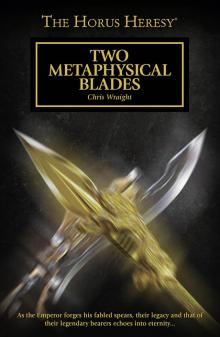 Two Metaphysical Blades
Two Metaphysical Blades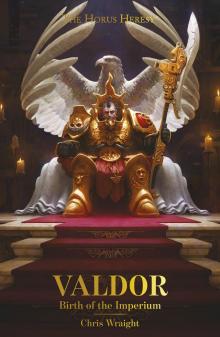 Valdor: Birth of the Imperium
Valdor: Birth of the Imperium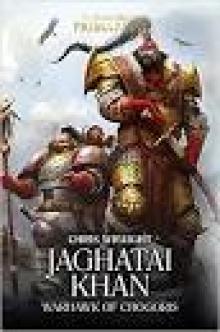 JAGHATAI KHAN WARHAWK OF CHOGORIS
JAGHATAI KHAN WARHAWK OF CHOGORIS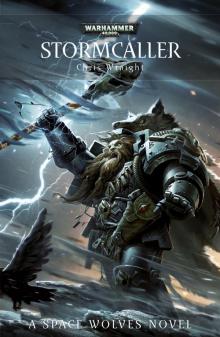 Stormcaller
Stormcaller Child of Chaos
Child of Chaos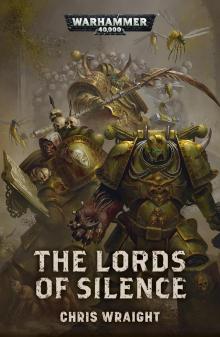 The Lords of Silence
The Lords of Silence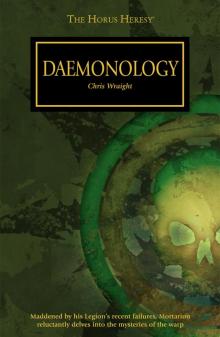 Daemonology
Daemonology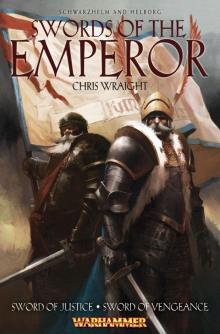 Swords of the Emperor
Swords of the Emperor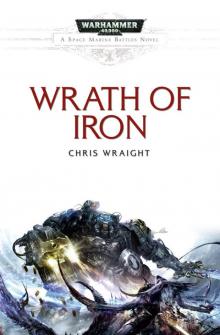 Wrath of Iron
Wrath of Iron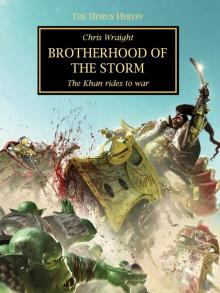 Brothers of the Storm
Brothers of the Storm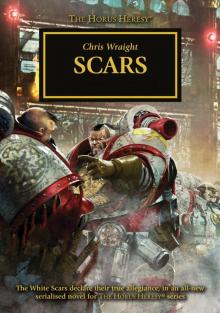 Horus Heresy: Scars
Horus Heresy: Scars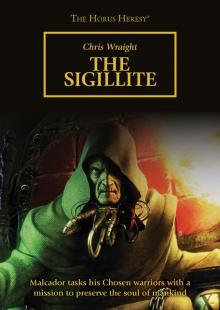 The Sigillite
The Sigillite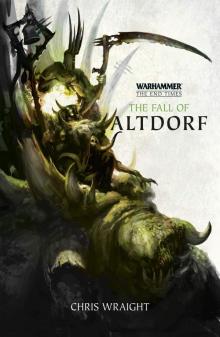 The End Times | The Fall of Altdorf
The End Times | The Fall of Altdorf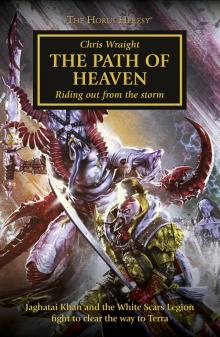 The Path of Heaven
The Path of Heaven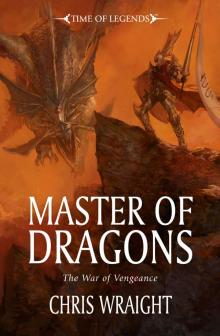 Master of Dragons
Master of Dragons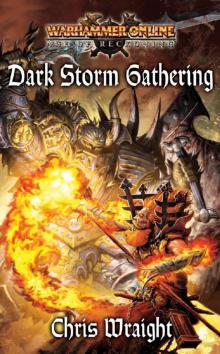 WH-Warhammer Online-Age of Reckoning 02(R)-Dark Storm Gathering
WH-Warhammer Online-Age of Reckoning 02(R)-Dark Storm Gathering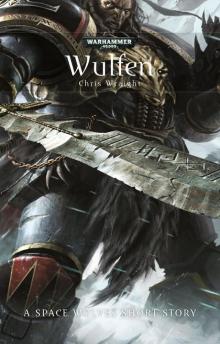 Wulfen
Wulfen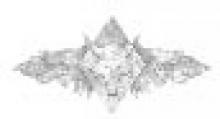 Battle Of The Fang
Battle Of The Fang Onyx
Onyx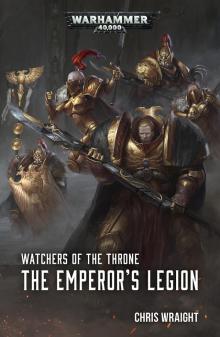 Watchers of the Throne: The Emperor’s Legion
Watchers of the Throne: The Emperor’s Legion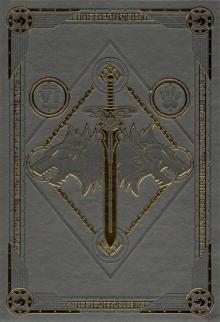 Leman Russ: The Great Wolf
Leman Russ: The Great Wolf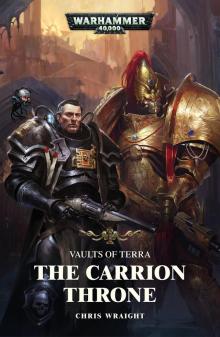 Vaults of Terra: The Carrion Throne
Vaults of Terra: The Carrion Throne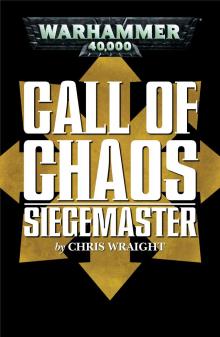 Siegemaster
Siegemaster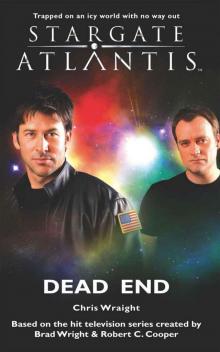 STARGATE ATLANTIS: Dead End
STARGATE ATLANTIS: Dead End Scars
Scars The Empire Omnibus
The Empire Omnibus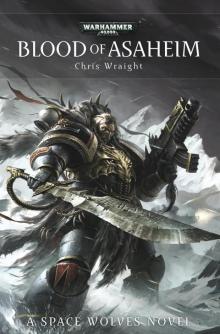 Blood of Asaheim
Blood of Asaheim